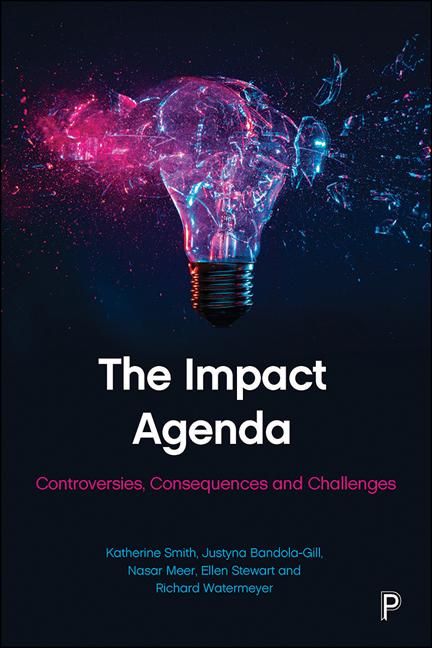Book contents
- Frontmatter
- Contents
- List of figures, tables and boxes
- List of abbreviations
- Notes on authors
- Acknowledgements
- 1 Introduction: Critical Reflections on Research Impact
- 2 The Rise of Research Impact
- 3 Debating the UK Impact Agenda
- 4 Do Experiences and Perceptions of Research Impact Vary by Discipline?
- 5 Impact on whom? Contrasting Research Impact with Public Engagement
- 6 Public Intellectualism and the Impact Agenda: International Perspectives
- 7 Academic Life in the Impact Vanguard: The View from Knowledge Exchange Organisations
- 8 Looking Back: Evolving Public Health Perspectives on Research Impact
- 9 Telling Tales of Impact: As Seen Through the Eyes of User Assessors
- 10 Conclusion: What Would an Evidence-Informed Impact Agenda Involve?
- References
- Index
9 - Telling Tales of Impact: As Seen Through the Eyes of User Assessors
Published online by Cambridge University Press: 23 February 2021
- Frontmatter
- Contents
- List of figures, tables and boxes
- List of abbreviations
- Notes on authors
- Acknowledgements
- 1 Introduction: Critical Reflections on Research Impact
- 2 The Rise of Research Impact
- 3 Debating the UK Impact Agenda
- 4 Do Experiences and Perceptions of Research Impact Vary by Discipline?
- 5 Impact on whom? Contrasting Research Impact with Public Engagement
- 6 Public Intellectualism and the Impact Agenda: International Perspectives
- 7 Academic Life in the Impact Vanguard: The View from Knowledge Exchange Organisations
- 8 Looking Back: Evolving Public Health Perspectives on Research Impact
- 9 Telling Tales of Impact: As Seen Through the Eyes of User Assessors
- 10 Conclusion: What Would an Evidence-Informed Impact Agenda Involve?
- References
- Index
Summary
While news of impact as a new component of research performance evaluation appeared, in the late 2000s, to provoke much in the way of concern among large swathes of the UK's academic community (see Chapter 3), as we have also seen (particularly in Chapters 6 and 7), research impact, as featured in the UK's REF and research council funders, was not all bad news to all people. Nor, as Chapter 8 highlighted, was it a completely ‘new’ feature of university life – certainly, as will be argued in this chapter, in the context of the way it was responded to and ultimately co-opted by institutions as an instrument of self-promotion.
This chapter builds on some of the concerns outlined across the rest of the book and considers how academics’ participation within the REF's impact audit regime produces contradictions that destabilise its rationalisation as a vehicle for enhanced scientific transparency and accountability. It discusses how the impact agenda has produced a variety of illusions and/or misassumptions related to transformational change on academic praxis. It also points to how the centralising and prioritising of impact as a performance expectation of academics is a false corrective that disregards and fails to acknowledge much of what many academics already do. This chapter is the book's most critical take on the research impact agenda, ultimately contending that, as a catalyst for cultural and behavioural change (leitmotifs of the era of new public management), the impact agenda no more ameliorates the nexus between science and society than it inauthenticates the potential for trustworthy, meaningful and sustainable relationships between scientists and their public patrons. Finally, it deals with the mythologies that have sprung from and courted an impact agenda for academic research in the UK.
Telling (one-sided) tales
In this chapter, we argue that the UK's approach to research impact specifically within the REF (which is the aspect of the impact agenda that appears to have prompted the most critique across the other chapters of this book) has affected and accentuated (and prospectively will continue to affect and accentuate) a cleft between academics and their public communities. This is because this approach to research impact ‘demands’ that academics invest resources in telling a good tale of themselves, and of themselves only at the expense and exclusion of their ‘public partners’, unless where called upon as corroborators.
- Type
- Chapter
- Information
- The Impact AgendaControversies, Consequences and Challenges, pp. 183 - 194Publisher: Bristol University PressPrint publication year: 2020

